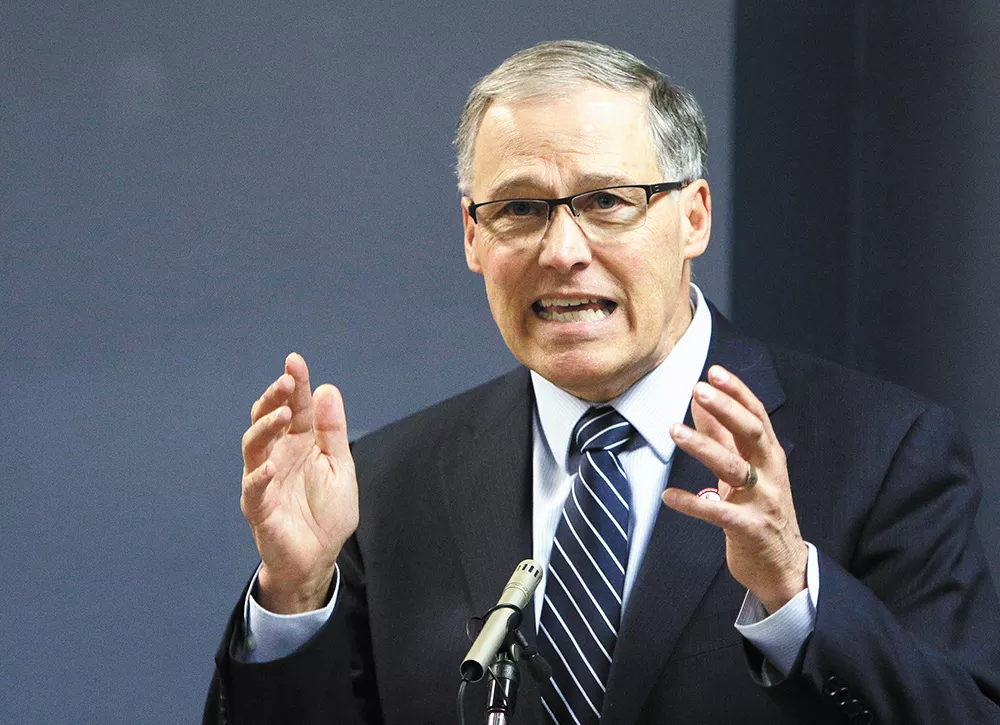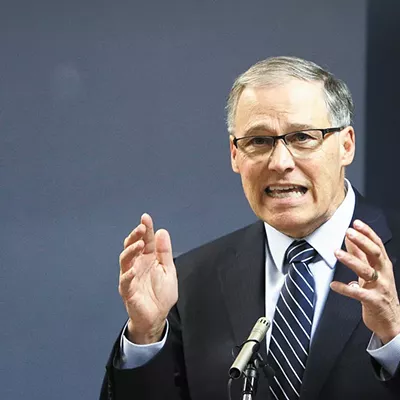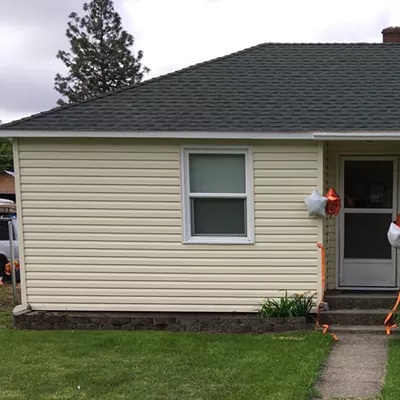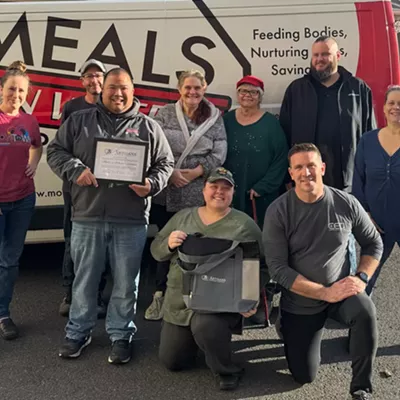With his eye on a potential presidential campaign, Washington Gov. Jay Inslee already has made plenty of national headlines in 2019. Since the New Year, Inslee has announced he'll be pardoning thousands of marijuana convictions. He's proposed remaking the state's financial aid system, aiming to make college effectively free for low-income students.
But maybe his most dramatic proposal came last month, when Inslee proposed a health care innovation he's calling "Cascade Care" — reminiscent of the "public option" proposals that were cut from Obamacare in 2010, back when Inslee was still in Congress.
Inslee's "Cascade Care" public option plan, however, wouldn't create a state-run insurance agency. Nor would it expand Medicaid. Instead, it would make the Inslee administration an insurance negotiator, tasking it with picking at least one insurer to offer Obamacare exchange coverage in every county. By wielding its powerful bargaining power, the argument goes, the state government could drive down prices, cap reimbursement rates and expand access in the individual market.
Yet even with the strongest Democratic majority in Washington state since 2010, it's a tough sell: Lobbyists for the powerful medical and insurance industries are wary.
"It's a bit of a unicorn," says Larry Levitt, health care expert with the Kaiser Family Foundation. "This is uncharted territory, at least in the private insurance market."
Back in 1992, Washington state launched a radical overhaul of the state's health care. In many ways, it was like the state was piloting Obamacare, two decades early. State Democrats expanded the state's Medicaid program, banned insurers from discriminating because of pre-existing conditions and featured an individual mandate requiring people to purchase insurance.
But voters rebelled: The next year, they booted Democrats from power, electing Republicans who promised to nix the most unpopular parts of the bill, like that individual mandate. But without a mandate to force them into the market, a lot of young healthy people opted not to buy insurance. Most of the people left on the individual market were old and sick people, the exact kinds of people who were the most expensive to ensure — driving up premium costs.
Washington state was in the dreaded death spiral: By the time 1999 rolled around, the Seattle Times reported, not a single insurer in the state was offering individual coverage.
In 2017, while Republicans failed to undo the Affordable Care Act, their tax bill effectively eliminated the individual mandate. Again today, the state's health insurance marketplace isn't exactly thriving.
"Right now, we have 14 counties in the state that have only one insurer," says Inslee health care advisor Jason McGill.
In 2017, the state's insurance commissioner had to scramble to find any individual market insurers willing to serve Klickitat or Grays Harbor counties.
"For the first time this year, we are seeing our uninsured rate blip up," says McGill. "We have gaps in the system still. It's going backward."
Effectively, the Cascade Care public option proposal would make Washington state the individual market's personal shopper.
Under Inslee's plan, the state would put out the call for bids for insurance companies to offer plans to the individual market. Anyone could apply, but with some major caveats. An insurer who partners with Cascade Care would have to cover the entire state, not just a handful of counties. The health insurance policies would need to meet a litany of standards intended to decrease out-of-pocket costs and increase transparency. And, crucially, the hospitals and doctors would only get paid as much as Medicare would pay them.
"Commercial plans pay more than the Medicare rates on average. Far more," McGill says. "Fifty percent more for some providers."
(Still, Medicare, the federal health care program for seniors, pays more than the rock-bottom reimbursement rates of Medicaid, which pays for health care for lowest-income individuals.)
That cap represents the public option's biggest potential asset — and biggest potential risk. There's plenty of evidence of public programs like Medicare and Medicaid lowering health care costs, says Levitt, the Kaiser Family Foundation health care expert. The question is whether Washington state's proposed public-private hybrid can do the same. After all, the state will have to convince insurers and providers to jump on board.
"I'd expect skepticism across the board from the health care industry," Levitt says.
So far, lobbyists for insurance and hospital industries in Washington state haven't taken a position, saying they're waiting to see the details.
"The concern that we have is that the Medicare rate is unsustainable. It does not pay for the cost of care," says Chelene Whiteaker, VP of government affairs for the Washington State Hospital Association. "Rural hospitals will have significant difficulty providing care to patients, while they're trying to absorb patients from the public option plan."
Having insurance doesn't do much good if doctors refuse to take it.
Democratic Senate Majority Leader Andy Billig of Spokane argues that a public option isn't unprecedented in Washington state: He points to the Basic Health Plan, a subsidized government-run insurance program that helped low-income Washington residents until 2014. Arguably, as a "public option," it was even more radical, involving more direct government control than Cascade Care would include.
"One of the lessons from the previous public option was that it worked and it was popular," Billig says.
Yet during the recession, Washington state repeatedly struggled to pay for its Basic Health subsidies.
Inslee's plan calls for funding subsidies to ensure that nobody on Cascade Care is spending more than 10 percent of their income on health care insurance premiums. But so far, Joe Schmick, Republican on the Washington state House Health Care and Wellness Committee, doesn't have any doubt about what he sees coming.
"We just have to be very clear," Schmick says, "that this is going to cost more money."
A longer version of this story was published in a Jan. 17, 2019, edition of the Inlander.























